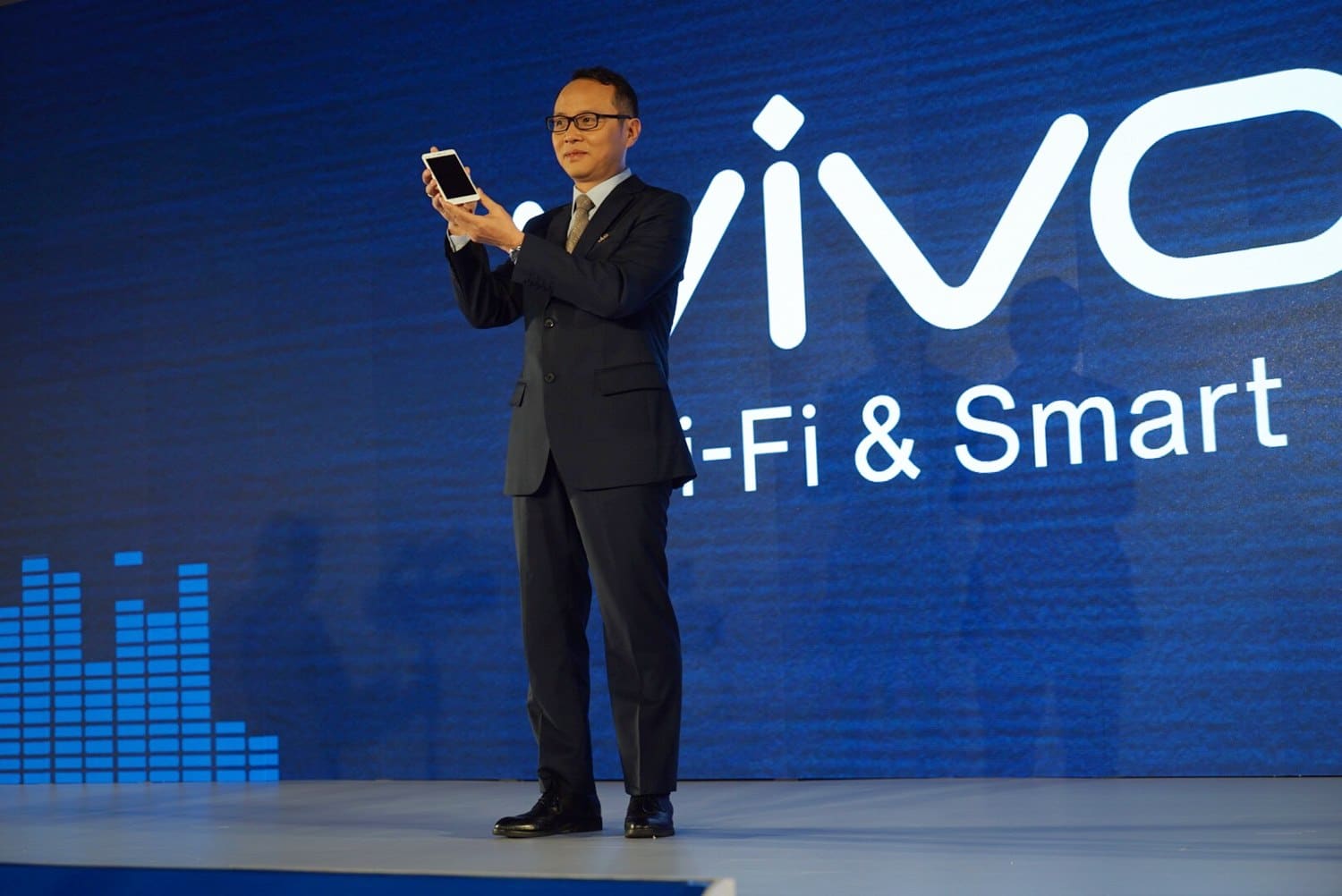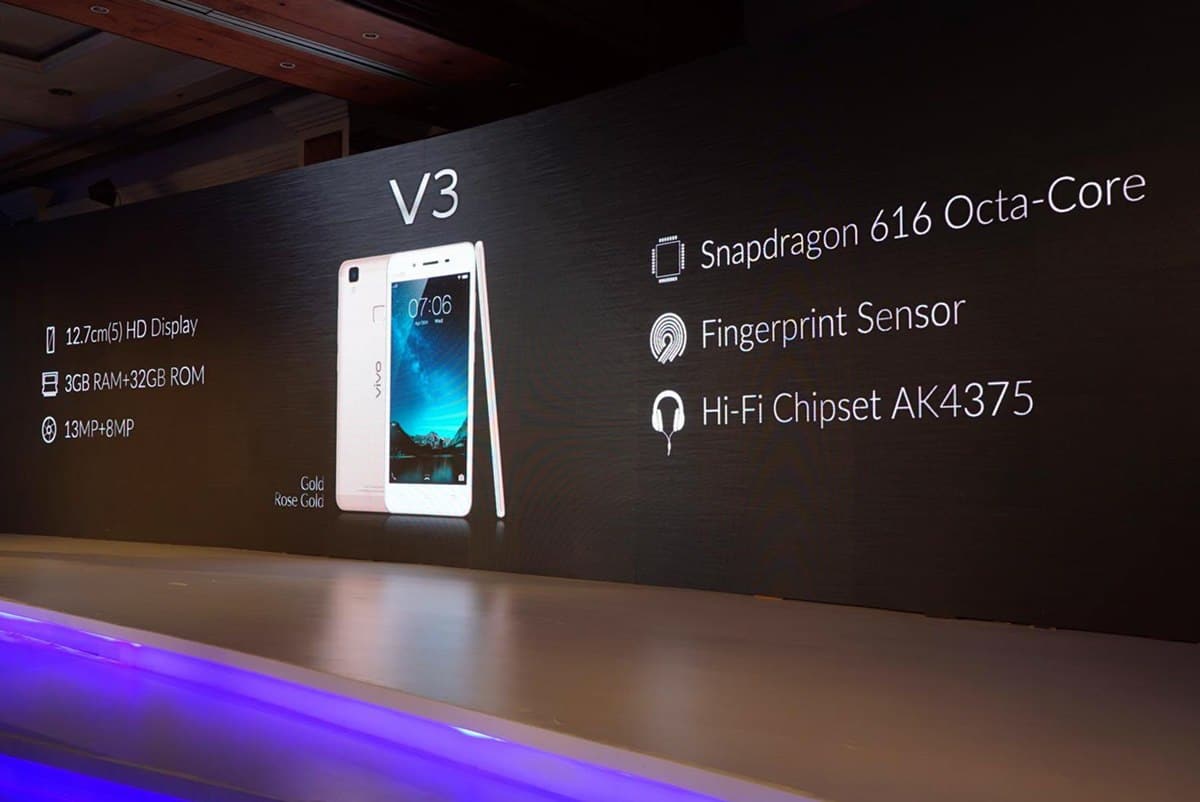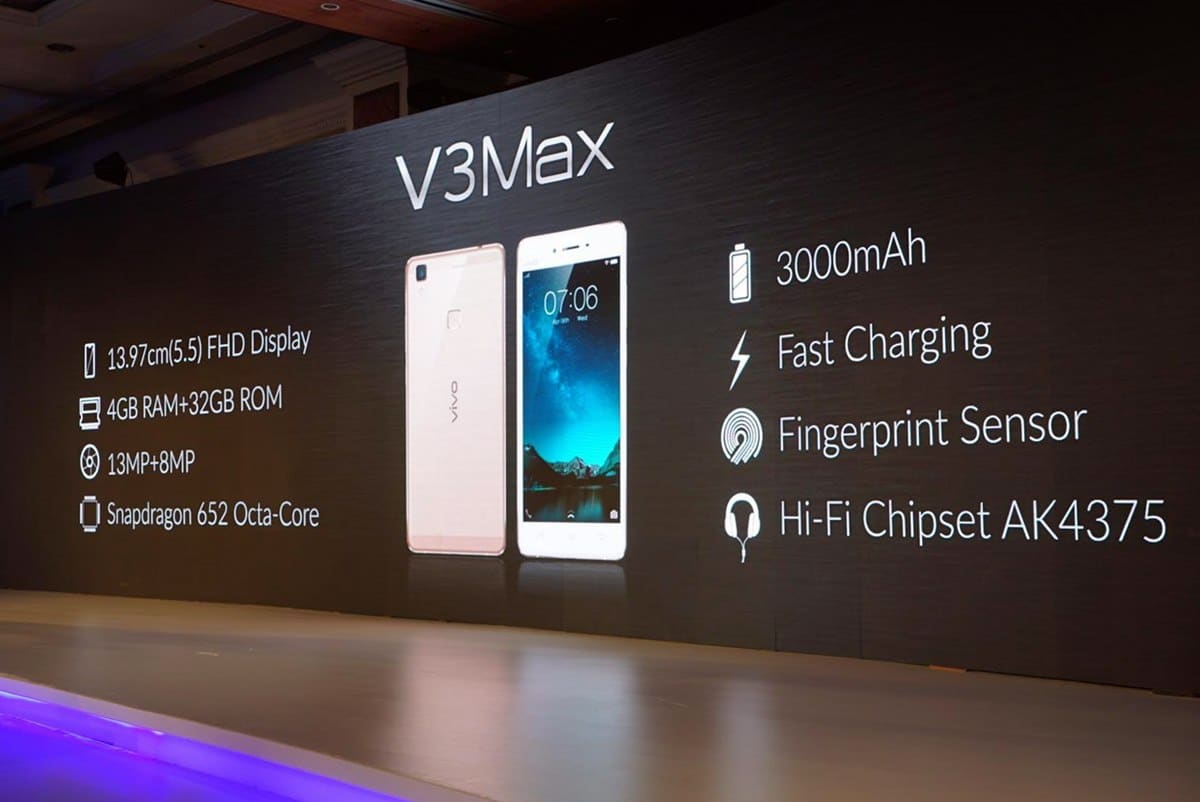India
Vivo V3 and V3 Max smartphones unveiled in India

Chinese smartphone brand Vivo today unveiled the V3 and V3 Max smartphones in India with the tag line: “faster than faster.” Vivo’s attempt to annoy the grammar Nazi in us aside, both phones seem promising from a technical standpoint.
And their desirability is amplified by the fact that neither of these devices will over-stress your budget when they arrive in select markets soon — the Philippines included. The V3 and V3 Max are priced at Rs 17,980 (Php12,500 $270) and Rs 23,980 (Php16,700 or $360), respectively.
The reasons behind the “faster than faster” claim are evident as you peruse the specs sheets of the Vivo V3 and V3 Max.
Inside, you’re looking at a Qualcomm Snapdragon 616 processor with 3GB of RAM for the 5-inch V3 and a Snapdragon 652 chip with 4GB of RAM for the 5.5-inch V3 Max. We gave the two phones a quick spin and found them to be responsive and sprightly.
Internal storage maxes out at 32GB, with the option to expand up to an additional 128GB using a microSD card. Both phones also come with a supposedly snappy fingerprint sensor located on the rear panel.
Photography is likewise a highlight for Vivo’s V3 line, as the phones’ rear-facing, 13-megapixel camera uses phase-detection autofocus, and is capable of locking onto a subject in 200 milliseconds (0.2 seconds) — shorter than the blink of a human eye, which takes anywhere between 300 to 400 milliseconds.
Firing up the default camera app shouldn’t take a whisker longer than that, as Vivo claims a startup time of only 700 milliseconds.
The higher-end V3 Max also supports fast charging with the included power adapter, and Vivo claims the feature provides up to 2 hours of high-fidelity music playback from 5 minutes of charging.
It’s obvious that Vivo’s V3 and V3 Max are built around the idea of super-fast operation, one that the company has pushed throughout the product announcement; but it didn’t have to.
See, if the phones do live up to the hype, Vivo would have no need for an awkward-sounding slogan, or analogies that resonate to very few people. If they’re fast enough, they’d be the talk of the town, for sure. Speed, or lack thereof, is one of the few things consumers can objectively judge with accuracy.
Hopefully for the V3 and V3 Max, the marketing talk will work out nicely.
[irp posts=”1944″ name=”Vivo V3, V3 Max Hands-On Review”]


There’s no doubt that India is a major market for technology. While the country has its own brand preferences outside of the world’s usual, everyone still wants to get a piece of the market. To the dismay of global companies, the country is realizing the potential of its own market. Effective immediately, India has started restricting imports for new laptops, tablets, and PCs.
Recently, India made some headlines in the smartphone industry. A few companies, including Apple, have poured funds into building factories in India. Locally produced devices will allow these companies to attract the Indian market better. With the new regulations out today, it looks like these brands are going to enjoy a head start over others who aren’t in the country yet.
The Indian government introduced a new restriction (via Reuters) against the importation of “laptops, tablets, all-in-one personal computers, and ultra-small form factor computers and servers” made from other countries. Customers, however, will get an exemption. Airline passengers can still bring in these devices in their luggage. Additionally, a single imported device is allowable when bought through e-commerce platforms. Companies can import their products only by applying for a special license.
In a nutshell, bulk orders without a license are out. The government is instead encouraging users to buy locally produced products as part of its “Make in India” program. At the very least, it’s not a total ban on foreign brands. For example, Dell, HP, and Lenovo are exempt from the regulations since they already have production facilities built in the country.
SEE ALSO: Samsung overtakes Xiaomi as top phone brand in India

Attacking a huge smartphone market is difficult. With preferences constantly evolving, it can get tricky to figure out the best lineup to capture most of a market. Samsung, however, has just done it. In the last quarter of 2022, Samsung has taken the crown from Xiaomi as the bestselling smartphone brand in India.
India is an important market for most smartphone brands. It’s one of the largest markets in the world. However, despite its size, the biggest players are often those who offer more affordable devices for consumers. Budget is the name of the game if a brand wants to make it big in the country.
Things are changing, though. According to new market data (via Reuters), Samsung has nabbed the throne from the former leader, Xiaomi. In the last quarter of 2022, the Korean brand grabbed 20 percent of the market, while the latter only got 18 percent.
In a trend dubbed as premiumization, Indian consumers are reportedly enjoying more disposable income, resulting in more willingness to buy pricier products. Additionally, the report hints that consumers have started equating lower prices with inferior quality.
With the market trending towards more premium products, Samsung took the lead with a lineup that consists more of midrange to premium devices. It will also be interesting to see if Apple, an even more premium brand, can also make a dent in the Indian market.
SEE ALSO: Buyer’s Guide: Samsung Galaxy S23 Ultra

For one of the largest smartphone markets in the world, India is one of the rarer countries where Apple does not outright dominate. Undoubtedly, the company is trying to change that. Ongoing job listings in India are suggesting that Apple is ready to open its first brick-and-mortar store in the country.
First reported by Financial Times, Apple has posted job openings in India for several retail roles including for the iconic Genius Bar. Another clue even indicates that some spots have already been filled ahead of time. A few employees in the country have reportedly posted about their new jobs on LinkedIn.
Unfortunately, none of the job listings show how many stores are planned and where they will be. Narrowing things down by a bit, a few of the confirmed employees are from Mumbai and New Delhi. The report also does not indicate when the stores will open. However, since a few have already been hired, a grand opening might be coming soon.
Apple has a lot to gain by strengthening its foothold in India. The country is an important stronghold for smartphone companies. However, the company might find things harder as time goes by. The country recently dictated that brands must switch to USB-C if they want to sell their devices in India. All over the world, Apple remains the last stalwart against adopting the more universal standard.
-

 Accessories2 weeks ago
Accessories2 weeks agoApple Vision Pro Review: Two Months Later
-

 Features5 days ago
Features5 days agoFortify your home office or business setup with these devices
-

 Gaming1 week ago
Gaming1 week agoThe Rogue Prince of Persia looks like an ultra-colorful roguelite
-

 Events1 week ago
Events1 week agoStellar Blade: PlayStation taps cosplayers to play Eve for game’s launch
-

 Gaming1 week ago
Gaming1 week agoStar Wars Outlaws release date revealed
-

 Accessories1 week ago
Accessories1 week agoLogitech unveils G Pro X 60 gaming keyboard: Price, details
-

 Philippines2 weeks ago
Philippines2 weeks agovivo Y100 to release in Philippines on April 27
-

 Deals2 weeks ago
Deals2 weeks agoSamsung Awesome April: Deals on Galaxy A series







































